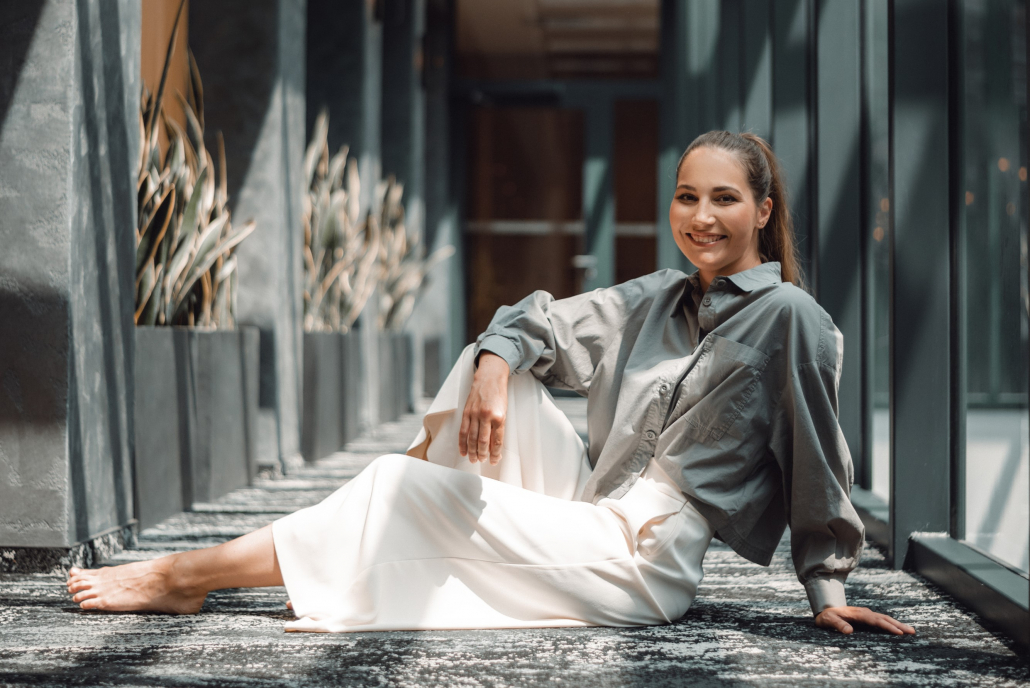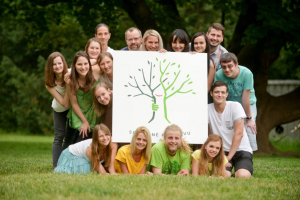Challenging treatment leaves marks on the body
Since 2016, the Outpatient Clinic for Oncology Follow-up Care under the direction of Tomáš Kepák, M.D., Ph.D., has been operating in the premises of St. Anne’s University Hospital Brno (FNUSA). It offers care to patients who have undergone oncological treatment in childhood. It responds to the development of knowledge about the long-term effects of treatment on the later state of immunity, cell aging, or the premature development of chronic diseases. In line with the current European trends, the follow-up care services are now moving into the psychosocial field alongside purely medical care. Mgr. Lucie Štrublová is in charge of nutritional counselling. Being a childhood cancer survivor herself, she shared her experience and insights with us in an interview.
Please tell us your story.
Dr. Kepak calls me a woman of several roles (laughs). I was treated for a neuroendocrine tumour from the age of 10 to 15. My illness then led me to choose my profession. I graduated as a nutritionist at the Medical Faculty of Masaryk University (LF MU), where I am also currently finishing my PhD. In 2015, together with two other healed friends, I founded the association Společně k úsměvu, z.s. (Together to Smile). As a patient organization, we collect the experiences of other people affected by childhood treatment to form a rich nationwide network. We feel there is a need to share our experiences with each other in an effort to support children, teens, young adults and their families during and after the challenging cancer treatment. We seek to do this through a number of projects.
But my greatest achievement in life is my daughter Anita.
How long have you been working in the Outpatient Clinic for Oncology Follow-up Care at FNUSA?
I have been at the outpatient clinic since January 1, 2023 as a nutritional therapist, but we have been working together since 2018 when I came as a researcher as part of my dissertation. I study the role of adipokines as predictors for the development of cardiometabolic risk in young adults after childhood and adolescent cancer. Adipokines are proteins in our body that are produced by our adipose tissue cells and also influence various metabolic and hormonal functions in our body. With our research team, led by Professor Julia Dobrovolna from the Faculty of Medicine, we are trying to find out what the production of selected adipokines in adipose tissue looks like in patients just after treatment.
What specifically is your task in your new role as a nutritional therapist?
I provide targeted nutritional counselling for patients who have a referral from their physician. We discuss proper lifestyle choices together and I assess their nutritional status. Based on my findings, I then provide patients with individualized plan to establish appropriate eating habits.
What is the waiting time for your services?
So far 1-2 weeks.
What difficulties do patients most often come with?
The most common are overweight, obesity or lipid spectrum disorders, i.e. imbalances in blood lipid levels. These problems often go hand in hand with cancer treatment. Some diagnoses are at risk of developing overweight or obesity and associated cardiometabolic problems after treatment. Examples of these diagnoses include acute lymphoblastic leukaemia or brain tumours. The development of overweight and obesity in these diagnoses is influenced by the interplay of several factors, of which the treatment itself, such as cranial radiation or hormone therapy, is a very important factor. Frequent physical limitations, which can be seen especially in patients after brain tumours, or poor education of parents or patients themselves about nutrition after treatment, also play a role. When dealing with these difficulties, I always try to take an individual approach with each patient.
How can nutrition affect the course of treatment?
Nutrition is an important part of supportive care during the treatment itself. A patient’s body that is malnourished responds less well to the treatment administered, has a higher risk of developing certain complications, and if they have had surgery, their wounds are slower to heal.
How long do you care for a particular outpatient?
So far, I am starting my activity and I am scanning the needs of the patients. I see patients who need longer-term cooperation, but also patients who I see 2-3 times.
Is there a story that sticks in your mind?
Definitely yes. I have worked with a young woman during my research, who went through a challenging cancer treatment in her teens. She was then faced with a secondary tumour again as an adult. We first met when she was very overweight, and that was very distressing. She did not feel comfortable in her own body, which was uncomfortable. When you’ve had such a challenging treatment, it leaves marks on your body. And especially treatment in adolescence doesn’t really boost self-esteem.
That’s when we started working together to change. She was very motivated and interested in nutrition, and she started moving regularly, running, exercising. Gradually her weight started to change, the amount of body fat dropped rapidly, and she started to feel good. Last week she had a consultation with me. I saw a confident woman and sitting in front of me, who had lost 10 kilos and felt like herself again.
Does your work extend beyond the walls of the practice – for example, by creating recommended practices for professional societies?
That’s my goal for the future. However, I don’t yet have the data and practical experience to create any practices.
The trend in cancer care now is to cover needs comprehensively, in collaboration with downstream disciplines such as yours. Do you think we are succeeding?
We are definitely doing better than in previous years.
How important is it for patients to support people who have gone through the same fate?
That support is crucial. Knowing that there are people somewhere who have experienced the same thing as me and can live a good life, can give me a helping hand and understanding.
To share your experience, you founded the aforementioned association Společně k úsměvu, z.s. Could you give us more details of the individual projects you are dealing with?
Our aim is to support children who are currently undergoing treatment and to help those who have completed treatment and are struggling with some of the late effects of treatment, such as psychosocial difficulties, nutritional problems, dental problems or fertility disorders. It is through individual projects that the association provides this help. In particular, I would mention the Wise Guide project, which is set up as a mentoring programme. A team of our experts trains a cured patient to become a mentor, who then provides support to children and families in the Department of Paediatric Oncology at the University Hospital Brno.
We also have a Self-Help Group project, which is a support group for people who are struggling with some of the late effects after treatment. The group is coordinated directly by a psychotherapist. It meets once every 2 weeks.
But a big part of our work is the Astra project, which is dedicated to the late effects of treatment. We are responsible for raising awareness of the late effects of cancer treatment through webinars, workshops and the production of educational texts and publications on the subject.
Besides nutrition, what topics do you think are important to communicate in relation to childhood cancer treatment – which the general society is not aware of?
There are a number of topics: discrimination in the labour market, life insurance or accessing a mortgage. The medical history that has been with the patient throughout his or her life plays a central role in these situations. Nowadays, in some European countries, the so-called ‘right to be forgotten’ has been approved for precisely these reasons. However, the return of patients to schools and communication with teachers and pupils in the classroom about the specific needs of these individuals is also problematic. This also includes depression, anxiety or fertility disorders.
How can clients seek your help?
In the Outpatient clinic, a physician refers patients for nutritional counselling. Within the association, you can reach us on our website or through social media.
Is there anything you would like to say to paediatric patients?
You are not alone!
And what would you say to the society in which the (cured) patients move?
The fact that at first glance you cannot see problems of a person after oncological treatment does not mean that he/she does not face them. There are many health problems and indispositions that are hidden and very difficult for us to communicate with someone who has not gone through the disease. Whether it’s chronic fatigue that prevents us from living life as we were used to before, even years after treatment, or whether it’s depression or anxiety that a large percentage of patients struggle with. Be considerate.
Thank you for the interview.
Author: Marta Vrlová, M.A., MPH, Senior PR Specialist ICRC, marta.vrlova@fnusa.cz.
Contact for media: Ing. Jiří Erlebach. Head of PR and Marketing, Spokesperson, FNUSA, +420 543 182 006. jiri.erlebach@fnusa.cz.



